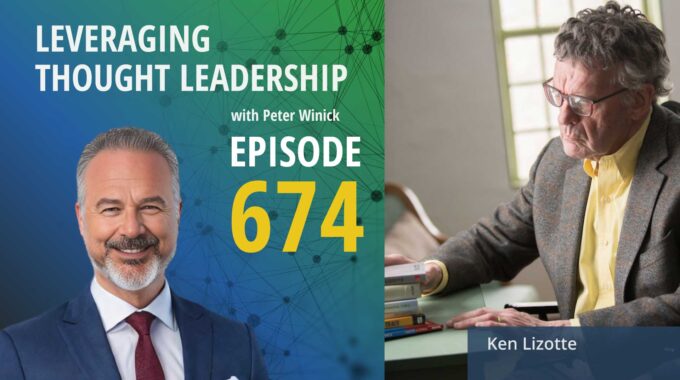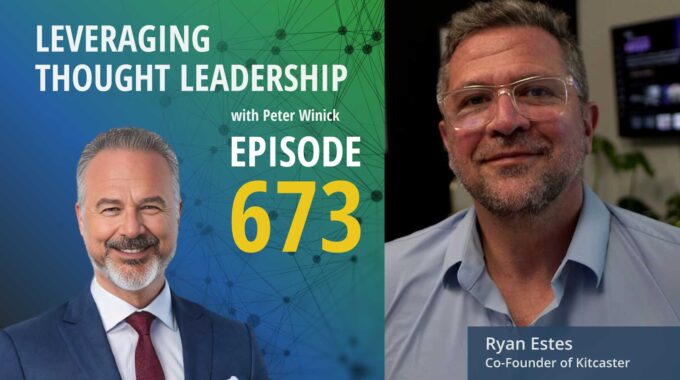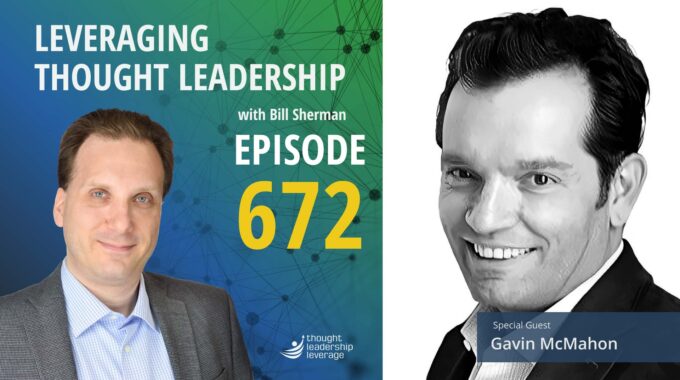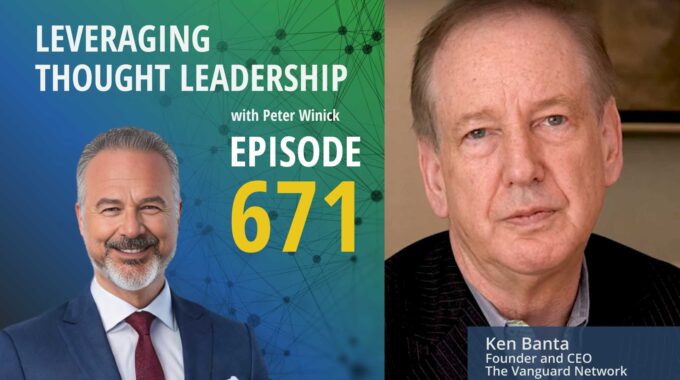Why Great Thought Leaders Don’t Play the Publisher’s Game Peter talks with publishing expert Ken…
The Power of Discipline and Candor in Executive Leadership | Des Hague
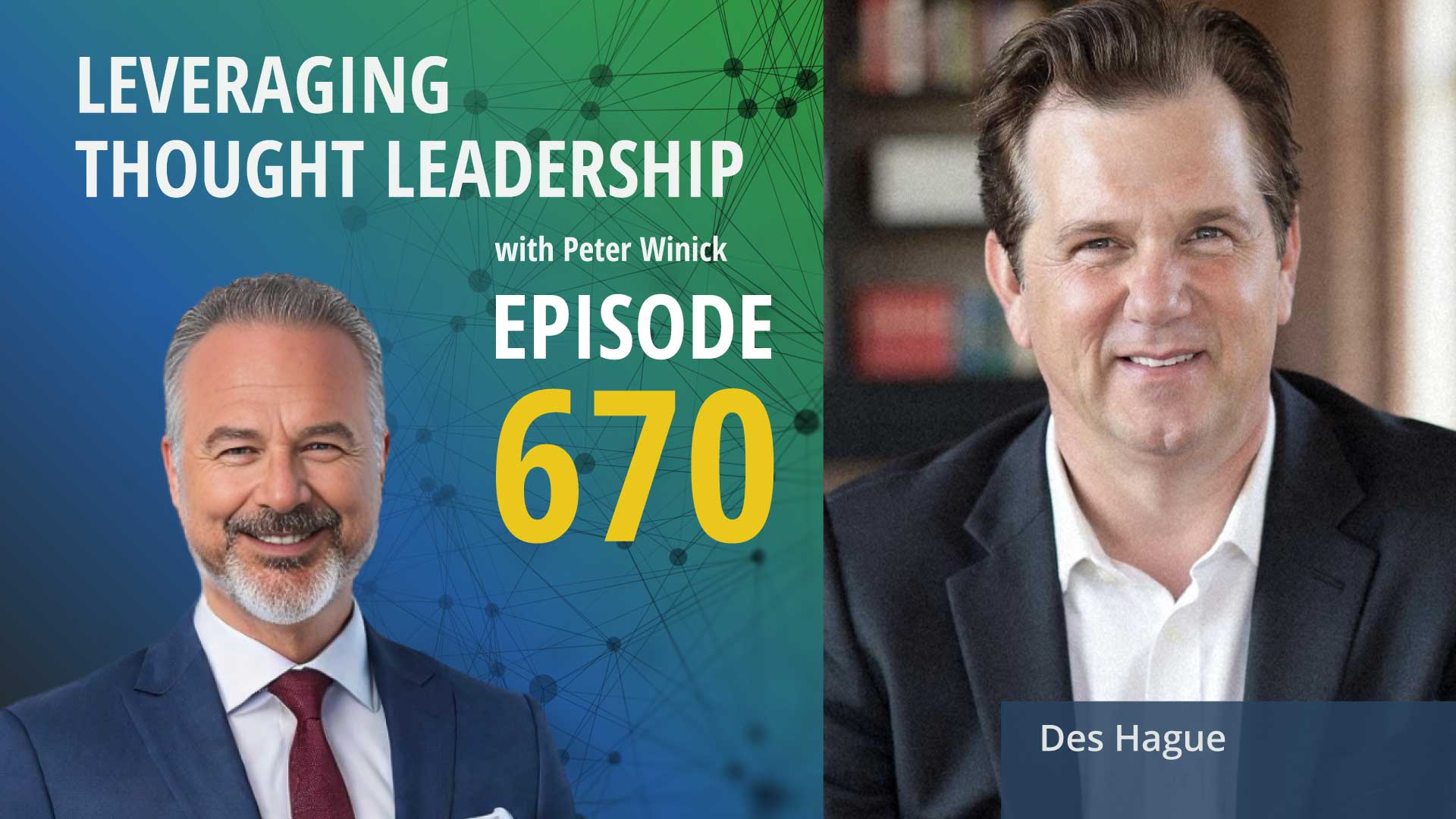
Lessons in resilience, growth, and accountability from a global CEO
This episode explores why thought leadership is a core function of effective leadership, not an optional extra. We discuss the importance of focus, sacrifice, and discipline in turning ideas into impact, while rejecting mediocrity and distraction. The conversation highlights how accountability, continuous learning, and resilience shape leaders who drive meaningful results.
What happens when a CEO treats thought leadership as essential as strategy?
In this episode of Leveraging Thought Leadership, host Peter Winick sits down with Des Hague, an acclaimed executive who has led global brands like PepsiCo, IHOP, and Centerplate, and now advises startups, nonprofits, and private equity firms. He’s also the author of “Think Your Way to the Top” and “15 Minutes of Shame”, with a third book on the way.
Des doesn’t see thought leadership as an optional side project. For him, it’s the natural extension of leadership itself—codifying the models, frameworks, and mindsets that fuel success. He shares why talent is always the starting point, how leaders must prioritize relentlessly, and why making time for writing and reflection is a choice, not a luxury.
We dig into the dangers of mediocrity and entitlement, the critical role of sacrifice, and how to stay focused in a world addicted to distraction. Des’s mantra, NSL—Never Stop Learning—pushes leaders to reject complacency and demand excellence from themselves and others.
He also opens up about resilience, accountability, and how leaders respond to their lowest moments. Through transparency and candor, Des reframes failure as a lesson, not a life sentence. His story challenges executives to hold themselves to higher standards, embrace growth, and remain relentless in their pursuit of impact.
This is an episode for leaders who want more than buzzwords. It’s about discipline, clarity, and the courage to lead with integrity—even when the spotlight is harsh.
Three Key Takeaways
- Thought leadership is leadership. Codifying frameworks, sharing ideas, and investing in personal development are essential for leading organizations and people effectively.
- Focus and sacrifice drive results. Great leaders prioritize ruthlessly, avoid distractions, and make deliberate trade-offs to create time for what matters most.
- Resilience and accountability matter. Owning mistakes, learning from setbacks, and maintaining a growth mindset, separate leaders who stagnate from those who continue to make an impact.
If you enjoyed Des Hague’s perspective on leadership, focus, and turning ideas into impact, you’ll want to dive into our episode with Will Milano. Both conversations tackle the discipline behind thought leadership—how leaders move beyond inspiration to frameworks, focus, and execution. Des shows how personal accountability and clarity shape great leadership, while Will unpacks how organizations can build a repeatable engine that scales those ideas into measurable business results.
Together, these episodes give you a 360° view: the mindset of the leader and the system that powers the enterprise. Listen to both, and you’ll walk away with practical insights for making thought leadership not just personal, but organizational.
Listen to Will’s episode here.
Transcript
Peter Winick And welcome, welcome, welcome. This is Peter Winick. I’m the founder and CEO at Thought Leadership Leverage. And you’re joining us on the podcast today, which is Leveraging Thought Leadership. Today, my guest is Des Hague. He’s an acclaimed executive leader known for his exceptional ability to lead global brands and deliver outstanding results. He advises startups and nonprofits and some private equity firms. He was the CEO of Center Plate, which is a huge hospitality business. He’s worked with such brands as IHOP, 7-Eleven, Maytag, PepsiCo, and is the author of two books. One is Think Your Way to the Top and the other is 15 Minutes of Shame. So welcome aboard, Des. How are you today?
Des Hague Thank you. And that was a great introduction. You should be my press agent from now on. Thanks, Peter. Life is great. I just I just make.
Peter Winick I’m with you. So I want to get a sense. So, you know, on the one hand, here’s the story of an executive, primarily hospitality related things in terms of IHOP, some PepsiCo and Center Plate, etc. And then you’ve delved in and out of thought leadership over the years in terms of the two books. So why like you’re obviously busy or as busy as you’d like to be, whatever that means. What called you to? Invest time and energy and effort and brain cells into thought leadership.
Des Hague It’s a great question, and I think I should ask my strength that, but the reality is this. I don’t believe you can really get to the pinnacle of business if you can lead companies, if you’re into, you know, sports or whatever else. I think a lot of your time is spent personally on development. So I don’t see as a departure. I see is more doubling down. I I think about when I. The wall came down in 89 and I’m sent over by PepsiCo into Poland, a parachuted in and I developed a four step process right back there in my early 20s. The number one being it’s all about the talent, Peter. It’s all about the people. If you got the right people, you got the right talent. Great things happen.
Peter Winick So it sounds like from from your take and I get that it’s really an extension of what it takes to be a great leader is to have a perspective, models, methods, frameworks. I think of it as sort of what was the operating system that helped you be successful as a leader in the organizations that you led? Is that is that a?
Des Hague Yeah, and I think it underpins always with people. And how do you have to, you know, how do you motivate? How do you optimize? How do you get the right people on the bus, on the right seat with the right mentality, with the right clarity, with the right.
Peter Winick Then it takes focused time to write the book or in your case, the books, right? You have to say, you know, it’s one thing to model that leadership and believe in personal development and leadership development when when you’re in the in the seat, right, when when you’re doing and you’re the role model of, you know with folks like companies like I have, you know, thousands of people. But then you have to carve out the time and the energy and there’s opportunity, cost and whatever to say you know I’m going to put this in a book. So what what what was behind that? I think it’s all about.
Des Hague We’re first of all, it’s about focus. And I always come back to you can do anything, but you can’t do everything. So I look at it and say, OK, what you know, how do I want to represent? How do I want to lift people up? I don’t think you can lift people up without really helping them develop, grow, stretch them. And it just became a natural extension. And so I wrote these two books. And by the way, I’m writing my third book now and the screenplay. And I’m on multiple boards and running an enterprise. I I come back to it’s about prioritizing having a plan. And quite candidly, Peter, if you look at the world today. The average person spends six hours on social media. I don’t spend six hours on social media. I spend about 15 to 30 minutes a day. So I got five and a half hours to do the things that other people think are too much. I don’t doom scroll. I’m right. I’m but that’s meant to I would.
Peter Winick Argued that. If it was 10 years ago, so it wouldn’t be social media that we’re doom scrolling on. People are watching television or street, you know, there’s lots of everybody that says they don’t have time. And when you when you actually drill down into that, yeah, there are some people that are, you know, laboring away 18 hours a day. But you don’t have time to do the other things. If you’re sitting there, you know. Eating Pringles and watching whatever is on Netflix this week.
Des Hague No, I think that’s a great statement. And to me, it’s about sacrifice. And I think that’s the miss, you know, people misunderstand what sacrifice means. Does it mean walking around like a Francesca monk whipping yourself? But I look at it and say, I have I have to say if I want to achieve something, the certain things that I’m not going to be able to do or that I used to like to do or, you know, if if I do that, then that what I want becomes the sacrifice. So it’s tradeoffs and priority. Right. And so, you know, again, you can’t blow the ocean. I boil a saucepan. My saucepan is my life and prioritize effectively.
Peter Winick Well, there’s definitely this growth mindset, this lifelong learning perspective as well that you embrace. Right. Because even though some of the businesses that you’re in, you know, if we look at IHOP or PepsiCo or some of these other ones, they’re not necessarily the most cutting edge as it relates to, you know AI or tech or whatever. But it doesn’t mean you can continue to do what you’ve always done. If you think about how covid has revolutionized hospitality and the restaurant business and all that. Right. How technology is embraced, it used to be, you know, put heat to meet was the old mantra in those businesses. Very, very different now.
Des Hague No, and I think that’s why I think when I think about kind of the special trades, one of the things that deserves its own kind of three letter moniker is NSL, never stop learning and it is you know, every day is a day to become more advanced. Yeah. And that goes into doing whatever it takes. I feel that, you know today there’s a challenge about mediocrity. And, you know, there’s a new the new goal seems to be mediocrity.
Peter Winick Because sometimes, you know, you go somewhere and you have an experience, whether that’s in hospitality or hotels or retail or whatever. And you walk away with that going, wow, that was better than I usually get. And then when you deconstruct it in your mind, you’re saying actually, it was quite mediocre, but the bar is so low that for someone to when you walk into a retail store today to actually not be on their phone and greet you and make a little bit of eye contact and ask to be helpful. That’s that’s not that wasn’t even table stakes, right? That’s just somewhere between etiquette and manners and the way things are done. And now, and maybe this is me being a grumpy old dude. You know, I feel like sometimes I walk into whether it’s a car dealership or hospitality restaurant, and I’m disturbing the people that are working there. You know little on me that’s trying to throw money at them. I was I was at a restaurant that, you know, the other night and I am waiting and waiting and waiting. At the bar to buy a bottle of wine because the reservation that we had, they’re running a half an hour late, so I’m already annoyed and I got so frustrated that I had to go to the matrician and say, you know, I’ve been waiting here 20 minutes to spend $100 on a bottle of wine. What’s wrong with this picture?
Des Hague I think Peter is spot on and it’s not being the grumpy old man or the grumpier old human. I mean, the reality is I think we’re breeding in a level of entitlement. I do not believe that equity has helped us at all. It should be a quality of options and then a quality of outcomes. You don’t have a normal table stake balanced, you know, gain. The winner takes all and the hardest one wins. And I think it’s the letters to victimhood where you see this. I mean, yeah, I ran 200,000 employees at Safeway and we didn’t all have our iPhones glued to our back pockets walking around. I wait for businesses today and it’s the norm. I’m sorry, if it’s an emergency, somebody’s going to call the store and say, I need to speak to X, Y and Z. You don’t have to have that lifeline connection. And I think technology is fantastic. I love it. I actually did a project back in 1995 with Whitbread. Talk about Y2K, if you remember that Y2 K more. And now it’s like we don’t think we can breathe and inhale and exhale without our cell phone being in our pockets. And that’s not. I love that you made.
Peter Winick Emergencies existed prior to cell phones, right? So there’s a big rigmarole right now. I live in New York where they’re banning the kids from having the cell phones in the classroom because these teachers can’t compete with the screen. You know, and the pushback from a lot of the parents is, oh, but if there’s an emergency, there’s and emergency. I’m like, I went to public school in Newark City. I don’t remember. I mean, I do remember other people, but like in all my years and 12 years of public school, never once. My parents had to run to the school because of an emergency. You know, if they needed to, there was a means by which they could do that. Right. Right.
Des Hague There’s a horrible incident happening. Having a cell phone is not going to get your parent there or your grandparents there any faster to help. So take away the phones from it. Our children in education would be a great stop. Plus, it would help them do the one thing that’s really required from a great student. Focus. Yeah, I think that focus piece is.
Peter Winick If you’re enjoying this. Episode of Leveraging Thought Leadership, please make sure to subscribe. If you’d like to help spread the word about our podcast, please leave a five-star review at ratethispodcast.com/LTL and share it with your friends. We’re available on Apple podcasts and on all major listening apps as well as at thoughtleadershipleverage.com/podcast.
Peter Winick I want to touch just for a moment on the 15 minutes of shame. So you wrote another book called 15 minutes of shame, we’re not going into the incident and all that. But the lens that I want to talk about that through is this incident happened. It was a horrible incident, right? And you the spotlight was on you in a negative way. There was really no way to come out of that and say I didn’t do it. Or what was done was done. But but how you. Chose to deal with that now and after speak to that a little bit.
Des Hague Yeah, well, I’m Irish, Peter. So, you know, you could say we just keep going and we don’t understand. I won’t get into the whole drinking thing and the stereotypes. But I think the reality is, hey, you know, I don’t want to even, you know belittle this as well or minimize this is the right word. In my professional career, losing my temper, no matter if I was hurt, fingers dislocated, whatever, I should have counted to 10. I knew I should have counted 10. I know I’ve got a fiery temper and I still over disciplined. Right. It’s a disappointment. And you have two choices to make, just like an adversity is either going to make you or break you. So if you think it will or you want it won’t, you’re right. So choose wisely and you can either decide to die on that. Issue as if that’s your worst. If losing my temper with a with an animal is the worst thing that I ever do in my life and I know it’s not, then I’ll be OK. I’m not happy with it. I was obviously it wasn’t my finest moment, but that is not a defining moment. And I think that’s critically important when people are. And by the way, Peter, nobody will get this unless they’ve really been under the microphone, under the spotlight of media rage. If they haven’t had a million just stay there a minute.
Peter Winick I think it’s a combination. I think you’re right. Of the media rage, I think there’s three things. There’s the media rage that we always have to assume we’re always on, right? I know even now, if I have a conversation with a friend about a purple sweater, the next thing I know on my laptop, purple sweaters are popping up, like it’s always on whether we’re aware of or not. And then when you’re in a leadership position, right, I don’t want to say that there’s a bullseye on your back. That’s not fair. But you have to be held to a higher, you know, you can’t have a bad day in public. Now, behind closed doors, you can have a crappy day and be in a miserable mood and be grumpy and do certain things you can do, certain things you can to, whatever. But when something’s caught in public and you’re a quasi public figure and, you know that’s the world we live in.
Des Hague No, I mean, you’re right. And I think that’s why you cannot say, you know, this is too fat. My incident happened in an area which wasn’t as hyper micro fishballed as today. This is even a worse environment. It’s tight and it’s even it’s more difficult. But, you know you’re on stage and you need to represent. And, you know, but the fact of the matter is we’re human, we make mistakes. What I did was a bornheaded stupid thing. If I could take it back, I would. But you can’t. So. Your question was, well, what’d you do? Well, you could even die with that issue and going to the forest and hide for the rest of your life. Or you can say, I’m going to use that to become a better person and drive on a minute because you could have.
Peter Winick Waited for the tides to go away and the dust to settle a little bit because eventually with the media, everybody sort of forgets. And, you know, it wasn’t like you did something so horrific that would be, you know, you’re going to be in prison the rest of your life. But you chose to share the story, share the lessons, share the learnings in a book. Right. So was that more about therapeutic, a forcing mechanism or what are you hoping other people would learn from reading that book? Because it’s pretty batch, I would say.
Des Hague My key message was. It’s never over, you know, I Peter, I see people. You know, committing suicide, you know 22 military people are committing suicide a day. You have thousands of people that can I mean, I look on there’s a lady on LinkedIn who post these things and I’d give her a shout out if I could call the center. She’s a kind, beautiful lady, and she lays these pictures out of. 24 year old with a great smile. Committed suicide for moms after that are a 37 year. It doesn’t matter who it is. It’s a it’s a it’s an equal opportunity. You know, curse. I don’t want anybody to feel that their life is not valuable. Luckily, Peter, in my 30s, I had enough in my war chest to never work again. But that people aren’t always as fortunate as that. And you’re a human being. You do a bad thing. Does it mean you’re a bad person? And there’s obviously there’s graduations of that. As I’ve said, I mean, you know, I got a misdemeanor, a speeding ticket fine. It was that was it, but it hurt my career immensely. And I and I just said, you know. Judge less if you’re going to, you know that the challenge to us all is how do we all become better? No, how do we become more belligerent about some of you makes a mistake? So my challenge and the reason for the right in the book was. It’s never over. It was a little bit therapeutic at the same time, but it’s about you can overcome. Right, you know you can make you know, and there’s a book I love in search of meaning by Viktor Frankl.
Peter Winick Yeah.
Des Hague You’ve got to why you can cope with almost anyhow. And I think about it. It’s humbling no matter what I went through 13, 14 years ago. That was somebody else’s best day. Context, you know, put things into perspective and you know if there’s a message out there, it’s if you’ve got a will to get through, you can. You never defined. You can continue to grow. You do bad things. I did a bornheaded thing. You have to atone for that. But you know I don’t know if it means.
Peter Winick Toning today. So even that atoning today. I think in many instances there’s a lack of accountability, responsibility, let me hide for two, three days, and this too shall pass. But I think regardless of what it is saying, I did that I own that. I’m not proud of that. And then maybe you get into some of the wise and some of them back, whatever. But there is a bit of a reluctance to say, yeah, I screwed up. I screwed a big time like that. That was a that was not my finest hour. That was not something I’m proud of. And that’s, you know, whatever the case may be.
Des Hague And great point, Peter, but I would tell you truthfully because I live this, so it’s my own lived experience and I won’t go into any word salads. But the reality is you can apologize till the cows come home and it’s like the Taylor Swift song. Haters are going to hate. You know, and they just hate. I mean, you said, oh, well, you know, can you imagine this incident happens? You forced to resign your. Kind of, you know, it’s a tough period. It has taught period of time and then you get death threats for the next 10 years. What I mean, if you get a death threat for that, you know you’ve got to. You got to go through the graduations of punishment. If somebody says it wasn’t causing cruelty, it caused distress, which is at a different level. It’s like, you see, that’s not cruelty. There’s distress. What world do we want to live in where? It’s like a pure Aniton, you know, tyranny out all kind of empires is there’s a lot of people.
Peter Winick I think on the accountability is, I think it’s a. Stat, because most people first deny. Well, there’s nothing wrong with what I did. People do bad things all the time and why are we talking about that? And it has nothing to do with how I function as a CEO. You know, they sort of smoke screen it. So all I was saying was just it’s not even about apologizing. I think about recognizing owning your own stuff for your own development. Yeah, no, it’s.
Des Hague Kind of Lee, I should have. I said to you, you know, there’s always a good thing about when you when somebody upsets your somebody hurts you. As long as you’re not getting beat up by folks and you’re getting mugged, I think there’s a point where you. Just going to yourself and think a little bit about what your response should be. And if we all were more mindful, I know in my case, that outcome would have never happened. Yeah, I had. I had a couple of dislocated fingers. Yeah, I was in a lot of pain, but come on, step back. Yeah, you know what? That’s the thing. When you when you when you hurt your flash and you’re learning that flash and that flash has helped me in my life from being, you know, abused and other things. I’m not gay. It’s not excusing, but it was my it was my safety mechanism that failed epically. Yeah, in this situation. Done great for me in the past. Yep, right place, right time.
Peter Winick Exactly, so I appreciate your sharing your transparency, your candor, your courage, and I thank you for coming on and talking about sort of the growth mindset, the lifelong learning and your commitment to thought leadership and such. So appreciate your time today.
Des Hague Peter, and I would say that, you know, also we uncovered my bornheadedness, which is something that you we I hope we all can learn from my mistakes to make you better.
Peter Winick Thank you so much. Have a great one.
Des Hague Thank you. Thank you, Peter.
Peter Winick To learn more about Thought Leadership Leverage, please visit our website at thoughtleadershipleverage.com. To reach me directly, feel free to email me at peter at thoughtleadershipleverage.com, and please subscribe to Leveraging Thought Leadership on iTunes or your favorite podcast app to get your weekly episode automatically.


